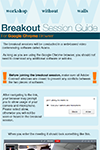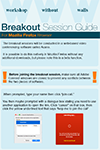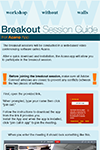-
Workshop Without Walls: Upstairs Downstairs
February 3, 2016Upstairs Downstairs: Consequences of Internal Planet Evolution for the Habitability and Detectability of Life on Extrasolar Planets
A NExSS/NAI/NSF Joint Workshop
February 17th – 19th, 2016
Tempe, Arizona, and other virtual locations (TBD)Click here for all of the archived presentations and discussions from this Workshop Without Walls.
Click here to RSVP to help us better organize this upcoming workshop. No commitment necessary!
Click here for the latest agenda.
Click here for information on how to participate remotely.
Science Organizing Committee:
Ariel Anbar (Arizona State University)
Rory Barnes (University of Washington)
Steve Desch (Arizona State University)
Shawn Domagal-Goldman (NASA Goddard Space Flight Center)
Cin-Ty Lee (Rice University)
Tim Lyons (University of California, Riverside)
Victoria Meadows (University of Washington)
Christy Till (Arizona State University)The chemistry and physics of planetary interiors shapes conditions at their surfaces in ways that profoundly affect habitability and our ability to detect life. The nature and extent of these interactions are not well understood even on Earth. For example, we debate the ways in which internal processes affected the emergence of an O2-rich surface environment on Earth, paving the way for complex life. As a result, we lack a guiding theory from which we can infer the likelihood that O2 will accumulate in the atmospheres of exoplanets with slightly different mass or composition from Earth. The implications for exoplanet habitability and life detection strategies have barely been considered.
This workshop will bring together astrobiologists, astronomers, planetary scientists, geochemists, geophysicists, and others needed to develop a working theory about the complex relationships between the surface habitability and internal evolution of Earth and Earth-like worlds.
The goal is a community research roadmap and whitepaper aimed at developing a theory of planetary evolution, from solar nebula to evolving world, that will guide the search for inhabited worlds into the next generation. To this end, the workshop will be open to community participation via face-to-face attendance at ASU, and virtual participation as a NASA Workshop Without Walls.
Key themes include:
Exoplanetary Observations
What can we observe now and in the near future that has bearing on facets of exoplanet geophysics and geochemistry that shape habitability and detectability?Physics and Chemistry in Planetary Formation
How does our understanding of planetary formation inform our ability to predict planetary compositions and hence important geophysical and geochemical parameters?Atmospheres and Biosignatures
What are our longer-term observational aims and how are they affected by surface-interior interactions?Physical Behavior of Planetary Materials and Planetary Structure
What are our limits of understanding of planetary material behaviors and surface tectonics, and how must this understanding extend and evolve to guide the search?Thermal and Chemical Evolution of Planets
What are our limits of understanding of solid planet evolution and how must this understanding extend and evolve to guide the search?Agenda
NOTE: All times listed are Tempe, AZ (MST)The meeting will be organized around three playful, provocative “debates” centered on assertions that cut across multiple research areas. A fourth debate will provoke synthesis. Each debate will consist of a 20 minute “pro” presentation, a 20 minute “con” presentation, 20 minutes back-and-forth and audience discussion, followed by parallel breakout sessions to hone in on issues identified, and a final group discussion. Virtual participation will be possible for all activities, including breakout sessions. We don’t expect that the debates will be settled. That’s really not the point. Rather, the point is to foster discussions about the meanings of key terms and concepts, and illuminate the processes that are and are not understood to guide future research.
Day 1 (Wednesday, 2/17)
9:00 Welcoming Remarks, Introductions
9:30 Presentation: Astronomical life detection in the next 10 years
10:30 Discussion
11:15 Debate “rules for the road”
11:30 Lunch on the Crater Carpet
12:30 Debate #1: “Resolved: Plate tectonics does not matter!
1:30 Breakout Discussions
2:15 Plenary Discussion
3:00 end of Day 1Day 2 (Thursday, 2/18)
9:00 ELSI Presentations
9:30 Debate #2: "Resolved: Composition makes no difference!"
10:30 Breakout Discussions
11:15 Lunch on the Crater Carpet
12:15 Plenary
1:00 Debate #3: "Resolved: O2 alone is not a sufficient biosignature!"
2:00 Breakout Discussions
2:45 Plenary Discussion
3:30 end of Day 2Day 3 (Friday, 2/19)
9:00 Debate #4: “Resolved: JWST will find life!"
10:00 Breakout Discussions
10:45 Plenary Discussion
11:30 end of Day 3Confirmed participants include:
Drake Deming, Maggie Turnbull, Christy Till, Adrian Lenardic, Chris Reinhard, Zach Sharp, Steve Desch, Marc Hirschmann, Tim Lyons, Everett Shock, David Catling, Shawn Domagal-Goldman, Aki Roberge, Roberta Rudnick, Jim Kasting, Anat Shahar, & Sujoy Mukhopadhyay
Remote Participation
All of our Workshops Without Walls strive to be all-inclusive and as interactive as possible for both in-person and remote attendees. This meeting will use a combination of Adobe Connect and Ubiety (a free, web-based videoconferencing tool).
For Plenary and Debate sessions, please join the following Adobe Connect meeting room:

Click the icon to the left to launch the Adobe Connect meeting room.
Choose the option to Login as a Guest, enter your name in the field, and then click Enter Room.
You will now be able to see/hear the broadcast, and participate via the chat window, which will be displayed prominently in the main room.
For Breakout Discussions, please use the following links to connect to the breakout room of your choice:
Breakout Group 1:

Or 

Join the Videoconference
Chrome/Firefox RecommendedDial-in with a Telephone
646-396-0444; Passcode: 80491458
Alternative to VideoconferenceView/Edit the Google Doc Breakout Group 2:

Or 

Join the Videoconference
Chrome/Firefox RecommendedDial-in with a Telephone
646-396-0444; Passcode: 69226260
Alternative to VideoconferenceView/Edit the Google Doc Breakout Group 3:

Or 

Join the Videoconference
Chrome/Firefox RecommendedDial-in with a Telephone
646-396-0444; Passcode: 70491296
Alternative to VideoconferenceView/Edit the Google Doc
Videoconferencing Quick-Reference Infographics
Please select the guide that corresponds to your browser.
If you do not have Chrome or Firefox, we recommend downloading the Acano app.



How-To Guide
Google Chrome UsersHow-To Guide
Firefox UsersHow-To Guide
Acano App (Mac/PC)
If you have any other technical issues or questions, please contact Mike Toillion (408.829.8430) or Sam Doshier.